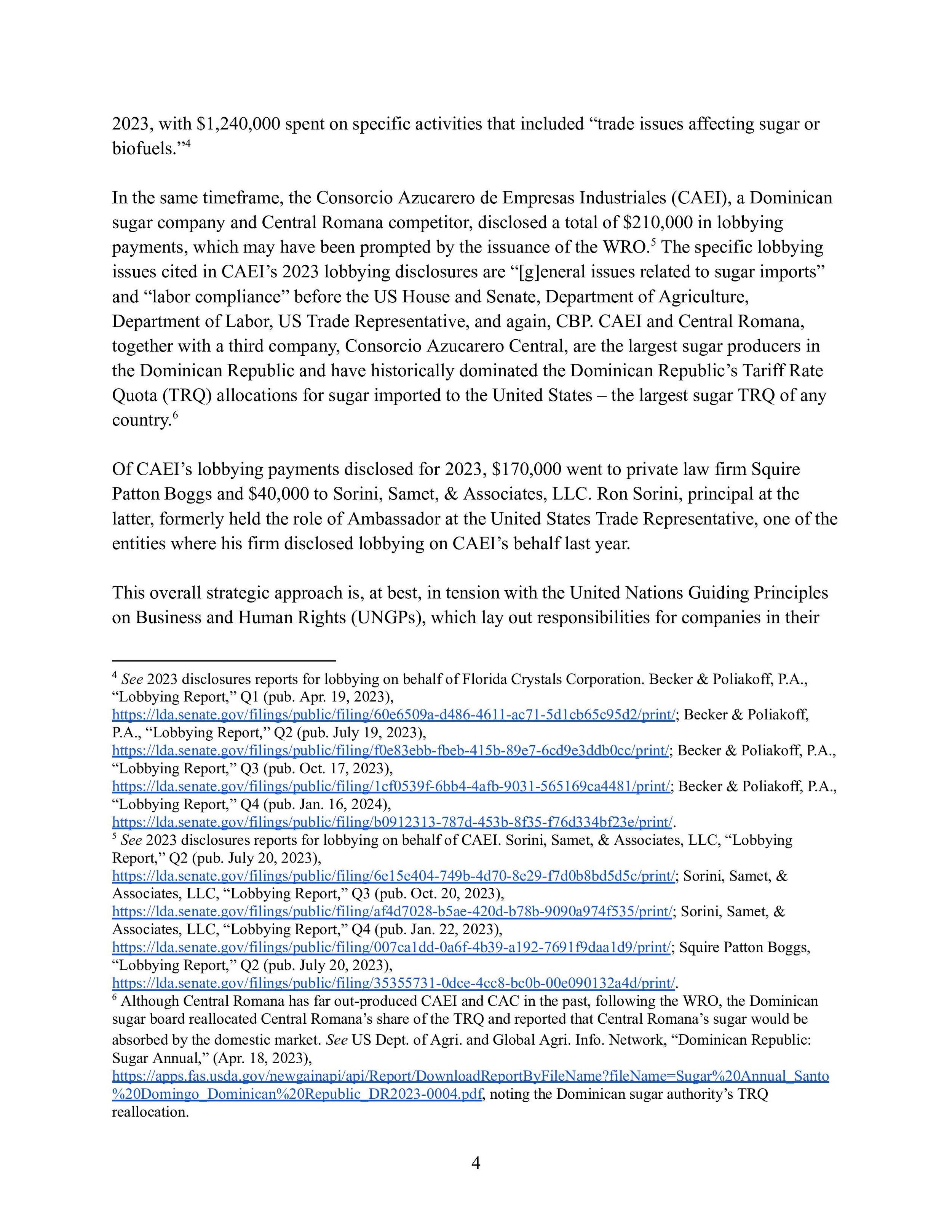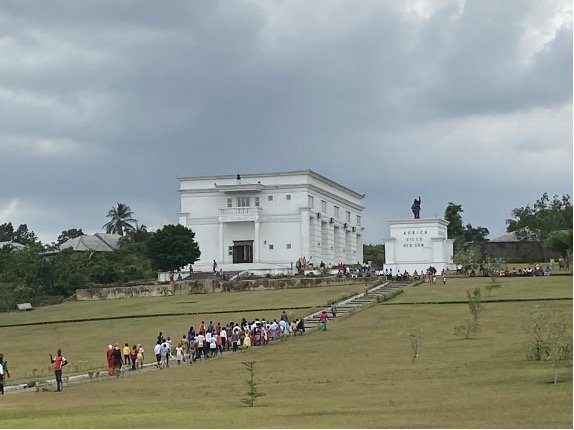CAL Joins 35 Organizations signing open letter to CBP highlighting Central Romana’s failure to remediate forced labor
A New Global Minimum Tax on Corporations and Human Rights Implications
This year, states will begin implementing a global minimum tax rate of fifteen percent on multinational corporations with more than €750 million (about $810 million) in revenues. If these tax reforms succeed in increasing tax revenues across the approximately 140 implementing countries as they intend, these additional funds could be used to advance the social and economic rights of their citizens, especially for the most vulnerable populations, including those whose rights have been abused by corporations historically. However, the coming tax reforms are still so riddled with gray areas regarding form and function that it is too early to call the initiative a victory in corporate accountability.
CAL and AfriLaw Document Widespread Forced Labor in the Nigerian Cocoa Sector
Across Nigeria, children, teenagers, and adults spend long days working on cocoa farms. Samuel* is one of these workers, a teenager who looks to be under eighteen – although he refused to tell us his age. Like the other workers on the farm, Samuel spends the day using a machete to chop down cocoa pods from trees, cut them open and remove the cocoa beans for drying and fermenting – dangerous work for anyone, but especially for children.
Shell to face constitutional claims for violating the right to a clean environment
On November 22, 2023, the United Kingdom’s (UK) High Court found that 13,000 Nigerian fisherman and farmers from the Ogale and Bille communities in the Niger Delta can bring landmark human rights claims against Shell for breaches of the communities’ right to a clean environment. Shell, a British-Dutch company, first began extracting oil from the biodiverse Niger Delta in the late 1950s under a joint venture it established with the Nigerian government just four years before Nigeria gained independence from Great Britain.
Lundin Corporate Executives Face Prosecution for Aiding and Abetting War Crimes
In October 2023, a landmark war crimes trial began in Sweden: the first prosecution in Swedish history of corporate executives for aiding and abetting war crimes. The trial opened to intense public interest – likely to intensify as it unfolds over the next two years. And for good reason. In many ways, this trial is legally unusual. The two corporate executives, Chairman Ian Lundin and former CEO Alex Schneiter, worked for the Swedish oil giant, Lundin Energy – previously known as Lundin Petroleum and Lundin Oil.
Un año desde la prohibición del azúcar del Central Romana en mercado EEUU por trabajo forzoso
Durante los 365 días desde que se bloqueó la entrada de su azúcar a los Estados Unidos por trabajo forzoso, el Central Romana ha optado por implementar sólo cambios superficiales para los cañeros y utilizar estrategias políticas en un aparente intento de hacer desaparecer la WRO.
One year since Central Romana sugar banned from US market for forced labor
Over the 365 days since its sugar was blocked from entering the United States, Central Romana has chosen to implement only superficial changes for workers while pulling political strings in an apparent effort to make the import ban disappear.
New Report for Fair Trade Month: Certified Exploitation
Far from being “empowered” by distant shoppers, or “thriving in fair and safe conditions,” workers on Fair Trade USA and Equitable Food Initiative certified farms in the San Quintín Valley in Baja California, Mexico have likened themselves and their conditions to “slavery of the 21st century.” This post introduces the report, Certified Exploitation: How Equitable Food Initiative and Fair Trade USA Fail to Protect Farmworkers in the Mexican Produce Industry, and its key findings.
Informe Nuevo para el mes de comercio justo: Explotación Certificada
Lejos de "empoderar" o hacer "prosperar en condiciones justas y seguras" a los trabajadores de las granjas certificadas por Fair Trade USA y Equitable Food Initiative, del valle de San Quintín, en Baja California, México, los trabajadores se han comparado a sí mismos y a las condiciones laborales bajo las que viven como unos "esclavos del siglo XXI". Este blog presenta los principales hallazgos del informe: Explotación Certificada: Equitable Food Initiative y Fair Trade USA y su Contribución al Abuso Laboral de los Trabajadores Agrícolas en la Industria Mexicana de Hortalizas.
CAL Sues over Sustainability Marketing for Açaí Likely Produced with Hazardous Child Labor
Açaí-harvesting communities in the Brazilian Amazon are demanding that companies like Sambazon address head-on the major risks associated with sourcing açaí, and that they restructure sourcing practices to maximize benefits to communities – not pretend that human rights risks are not present. Sambazon should put its money where its mouth is and make sustainability a reality in its supply chain – or, at least, ditch the misleading marketing. When businesses sell products that are likely made with hazardous child labor, they should not be able to paint a rose-colored image of sustainability to consumers.
Human Rights Organizations & U.S. Shrimp Producers file amicus brief supporting Cambodian victim-survivors of forced labor
On August 21, 2023, attorneys at Corporate Accountability Lab (CAL), Global Labor Justice-International Labor Rights Forum (GLJ-ILRF), and the Law Offices of John Burton filed an amicus brief with the Ninth Circuit Court of Appeals on behalf of more than twenty human rights organizations and U.S. shrimp producers supporting the plaintiffs in Ratha v. Rubicon Resources, LLC.
CAL’s Consumer Protection Suit Against Rainforest Alliance Dismissed on Procedural Grounds; Case Proceeds Against Hershey
On June 20, the Washington D.C. Superior Court dismissed Corporate Accountability Lab’s (CAL) consumer protection suit against The Rainforest Alliance, Inc. (Rainforest Alliance), an eco-social certifier, for lack of personal jurisdiction. In the same order, the judge refused to grant The Hershey Company’s (Hershey) motion to dismiss the case against them as co-defendants. This post discusses the mixed decision and the significance of the dismissal of claims against Rainforest Alliance.
Thirty Years Later: The Resilience of the Ogoni
Thirty years ago, the Ogoni people of the Niger Delta in Nigeria drove the multinational oil company Royal Dutch Shell (Shell) out of their territory. This nonviolent movement, led by the Movement for the Survival of the Ogoni People (MOSOP), was extraordinarily powerful. Yet, as CAL staff members saw on a visit to Ogoni in early March 2023, the struggle is far from over. The harm the oil industry wrought on this community in the 1990s runs the gamut from environmental devastation, to political oppression, to rape and murder. The dilapidated oil infrastructure in Ogoni appears to still be leaking oil into the environment, children and adults still suffer health impacts, and the fish (traditionally a major source of protein for the Ogoni population) remain scarce. But the joy and spirit of resistance is also still alive.
So-called Sustainability programs are failing cocoa farmers and their families: How Nestlé and Mondelez greenwash – and labor wash – their chocolate products
The West African cocoa industry, where two-thirds of the world’s cocoa is grown, is notorious for its human rights abuses. From hazardous child labor to child trafficking to the poverty wages that farmers earn, little of the cocoa supply chain in West Africa is “fair” or “sustainable.” Yet over the past decade, certification schemes – such as Rainforest Alliance, Fairtrade International, and Fairtrade USA – and so-called sustainability programs – like Mondelez’s Cocoa Life, Nestlé’s Cocoa Plan, Mars’ Cocoa for Generations, and Hershey’s Cocoa For Good – have proliferated.
CAL Provides New Information to CBP on Child Trafficking and Forced Child Labor in the Cocoa Sector
On February 14, 2023, Corporate Accountability Lab (CAL) submitted information to Customs and Border Protection (CBP) under Section 307 of the Tariff Act documenting instances of forced child labor in the Ivorian cocoa industry. This petition comes exactly three years after we first provided CBP with information documenting child trafficking and forced labor on the Ivorian cocoa farms that source to chocolate brands in the United States.
Shell Agrees to Pay $15 million Euros to Nigerian Farmers and Fishermen
For decades, Shell allowed oil to leak into the Niger Delta, destroying fields, making water undrinkable, and harming local populations. Over the years, there have been numerous cases filed against Shell, related to different aspects of Shell’s destruction of the Niger Delta and associated human rights abuses. (See here, here, and here.) In December 2022, Shell settled one of these cases – for 15 million Euros – after a Dutch appeals court ordered the company to compensate victims harmed by Shell’s subsidiary, Shell Petroleum Development Company of Nigeria (SPDC). This blog post first describes the environmental and human rights abuses Shell has caused in the Niger Delta. It then explains Shell’s settlement and discusses the importance of this historic case and the settlement.
Certification Schemes: Why Fairtrade International, Rainforest Alliance and Others are Failing Workers and Consumers
These days, if you go into a grocery store, there are numerous labels on food products touting how ethical and sustainable the product is. Yet these certification labels often misrepresent the labor and environmental standards used to produce these products. Certification schemes, such as Fairtrade International, were initially developed to provide workers – often farm workers in rural areas – with increased income, better working conditions, and a steady stream of buyers. Moreover, they signaled to consumers that the products were produced sustainably, without exploiting workers, children, or the environment.
DOJ settlements and fines against Glencore and Lafarge won’t compensate victims of bribery practices and terrorist financing abroad, but it’s a start
Last month, Glencore and Lafarge, two well-known multinationals, made international headlines after their guilty pleas for criminal conduct abroad led to multimillion dollar settlements and gave rise to civil claims. This post discusses the Glencore and Lafarge cases and their recent guilty pleas for bribery and for financing foreign terrorist organizations, respectively. These cases are discussed through the lens of the DOJ’s new strategy to prosecute corporate misconduct. This blog considers how these cases could be a starting point for corporate accountability and access to remedy, rather than as the gold standard.
Two Years On: Corporate Power Yields to Nothing, Not Even Democracy
Two years ago, US democracy was threatened when election-denying citizens and militias stormed the US Capitol, demanding that federal representatives overturn the results of a valid election. This insurrection, while ultimately unsuccessful, cost lives and called into stark question the future of American democratic institutions. In the wake of this deadly attack, companies across the United States, including many of the largest, pledged not to support members of Congress who fueled the insurrection and voted — in the early morning of January 7, 2021, mere hours after Capitol windows were smashed and Capitol police were beaten — to abandon the winner of an election that was unambiguously fair and free.
A year ago today, on the first anniversary of this anti-democratic attack, we wrote about the scores of Fortune 500 companies that funded election-denying members of Congress, even after making — and, no doubt, profiting from — public vows not to. At that time, we said that better politics and stronger democratic institutions depended on reimagining corporate power. Consider this our progress report.




































